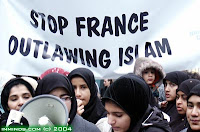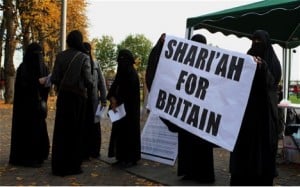Everybody’s jumping on the “Ban Hejab” bandwagon these days. For Germany and Canada, it’s done in the name of secular society and “equality.” For Turkey and Tajikistan, it’s done in the name of secularism, too, but also as a distinct agenda to curtail religious influence in popular opinion and government.
The idea of banning hejab is a nasty, exclusionary, and downright ignorant political trick (especially if you read the news link for Germany). But here’s my real beef with the whole hejab ban: it’s being touted as a “religious issue” instead of a “women’s issue” or a “personal freedom issue”, where it belongs.
 Filing “hejab bans” under religious discrimination isn’t fully incorrect, but neither is it fully correct. Making the hejab bans a religious issue implies that hejab is mandatory and part of Islamic belief. While many Muslim women see it as a mandatory obligation, many Muslim women do not: Islamic scholars still debate verses in the Holy Qur’an and ahadith that pertain to the idea of a woman covering herself. There are many devout Muslim women who don’t observe hejab for whatever reason, and decrying hejab bans on the pretext of religious freedom leaves these women (who are potential allies) out.
Filing “hejab bans” under religious discrimination isn’t fully incorrect, but neither is it fully correct. Making the hejab bans a religious issue implies that hejab is mandatory and part of Islamic belief. While many Muslim women see it as a mandatory obligation, many Muslim women do not: Islamic scholars still debate verses in the Holy Qur’an and ahadith that pertain to the idea of a woman covering herself. There are many devout Muslim women who don’t observe hejab for whatever reason, and decrying hejab bans on the pretext of religious freedom leaves these women (who are potential allies) out.
The issue of banning hejabs (or any other religious garb or symbols worn on the body) is really an issue of personal freedom, but banning the hejab specifically targets women. The reality of a hejab ban is that a government would (or does, in Turkey’s & France’s cases) not allow women to wear an item of clothing if she wants to.
Using hejab bans as a religious issue also complicates opposition. For example, the Council for American-Islamic Relations (CAIR) opposes discrimination based on hejabs, and would likely speak out on the issue if the American government ever decided to follow France’s and Turkey’s leads by banning hejab in public institutions. But would women’s groups, such as the National Organization for Women (NOW), speak out against this? If it’s touted as a “secularist/religion” issue, probably not. But if we see these bans for what they really are (taking a woman’s personal freedom of expression away), maybe women’s groups would be inclined to speak up.
Bias alert: I’m speaking from an American viewpoint here, so I’d love to hear any non-American reader’s perspective on this. But from an American standpoint, it seems silly that women can wear bikinis, mini-skirts, etc., but that people should get all riled up about a scarf on someone’s head. It’s legal for women to wear men’s clothing and for men to wear women’s clothing. It’s legal for people to wear clothing with political messages, images, or words that might offend others. And currently, it’s legal in the U.S. for women to wear scarves on their head (Muslim or not) if they choose.
But Canada and Germany have constitutions, too. And German and Canadian citizens are guaranteed freedom of expression and freedom of religion. So why isn’t anyone getting angry that these women’s freedom of expression is (or could be) being taken away? Why isn’t anyone seeing this for what it really is: the issue of women’s freedom and right to wear what she wants?














